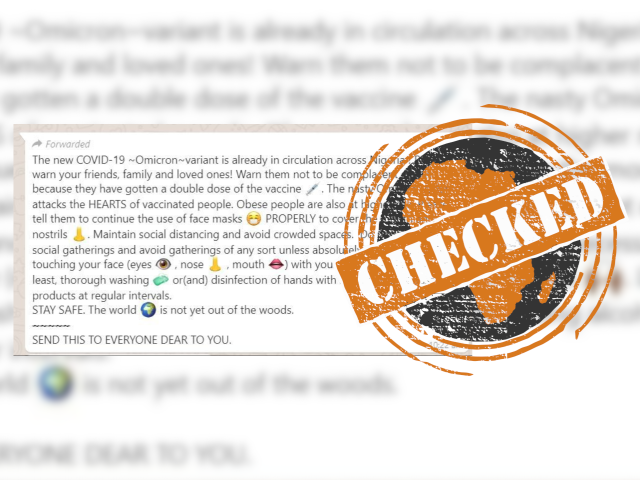Does “every single person” suffering from cancer have “a pH that is too acidic”? This startling claim is made on a meme circulating on Facebook in South Africa.
The meme includes a graphic with an arrow pointing to “acidic” labelled “illnesses”, and an arrow pointing to “alkaline” labelled “health”.
It ends with a questionable claim of authority: “Dr Otto Warburg won the Nobel Prize in 1931 for proving that cancer cannot survive in an alkaline, oxygen rich environment but thrives in an acidic, low oxygen environment.”

US fact-checking site Snopes researched a similar meme in 2016 and rated it false.
First, the claim doesn’t even say what “too acidic” means. An article on Health Line explains that pH is measured in a range from 0 to 14. Acidic substances run from 0 to 6.9, neutral is at 7, and alkaline from 7.1 to 14.
The pH in our bodies varies. Our stomachs contain strong acid to digest food. Our blood is slightly alkaline. Our urine can be acidic or alkaline depending on what we eat.
The “alkaline diet” – which Health Line rates as a myth – claims that alkaline foods include fruit, nuts, legumes and vegetables, while acidic foods are meat, poultry, fish, dairy products, eggs, grains and alcohol.
The diet is healthy, but not because of the pH of the food. It works simply because fruit, vegetables and nuts are healthy food, and meat, dairy products, eggs and alcohol less healthy.
And as Snopes points out, the meme gets Nobel laureate Warburg’s finding backwards.
“Warburg’s main contribution to cancer research was the observation that cancer cells actually produce low oxygen and high acid conditions, not that they are caused by such conditions in the first place.”
There is no link between an “acidic” diet and cancer. And cancer cells also grow in alkaline environments. – Africa Check (29/05/19)
The meme includes a graphic with an arrow pointing to “acidic” labelled “illnesses”, and an arrow pointing to “alkaline” labelled “health”.
It ends with a questionable claim of authority: “Dr Otto Warburg won the Nobel Prize in 1931 for proving that cancer cannot survive in an alkaline, oxygen rich environment but thrives in an acidic, low oxygen environment.”

Understanding acid and alkaline in the body
US fact-checking site Snopes researched a similar meme in 2016 and rated it false.
First, the claim doesn’t even say what “too acidic” means. An article on Health Line explains that pH is measured in a range from 0 to 14. Acidic substances run from 0 to 6.9, neutral is at 7, and alkaline from 7.1 to 14.
The pH in our bodies varies. Our stomachs contain strong acid to digest food. Our blood is slightly alkaline. Our urine can be acidic or alkaline depending on what we eat.
‘Alkaline diet’ food is simply healthy food
The “alkaline diet” – which Health Line rates as a myth – claims that alkaline foods include fruit, nuts, legumes and vegetables, while acidic foods are meat, poultry, fish, dairy products, eggs, grains and alcohol.
The diet is healthy, but not because of the pH of the food. It works simply because fruit, vegetables and nuts are healthy food, and meat, dairy products, eggs and alcohol less healthy.
Cancer produces low oxygen, acidic conditions
And as Snopes points out, the meme gets Nobel laureate Warburg’s finding backwards.
“Warburg’s main contribution to cancer research was the observation that cancer cells actually produce low oxygen and high acid conditions, not that they are caused by such conditions in the first place.”
There is no link between an “acidic” diet and cancer. And cancer cells also grow in alkaline environments. – Africa Check (29/05/19)
Republish our content for free
For publishers: what to do if your post is rated false
A fact-checker has rated your Facebook or Instagram post as “false”, “altered”, “partly false” or “missing context”. This could have serious consequences. What do you do?
Click on our guide for the steps you should follow.
Publishers guideAfrica Check teams up with Facebook
Africa Check is a partner in Meta's third-party fact-checking programme to help stop the spread of false information on social media.
The content we rate as “false” will be downgraded on Facebook and Instagram. This means fewer people will see it.
You can also help identify false information on Facebook. This guide explains how.





Add new comment